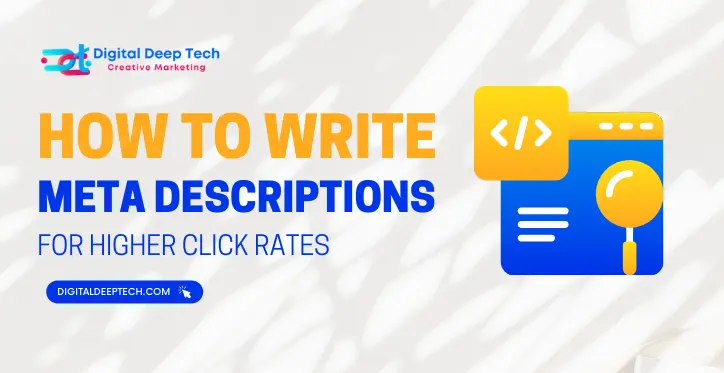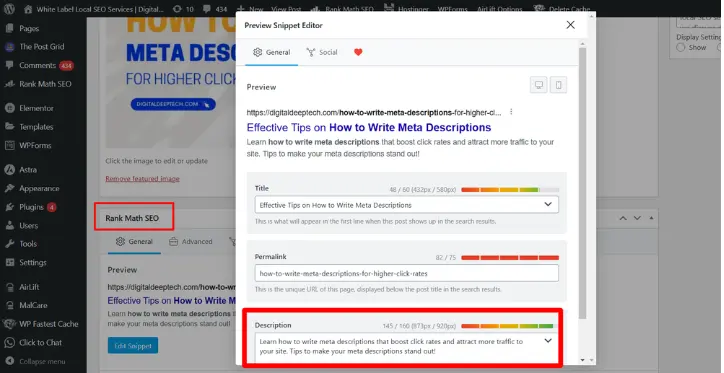How to Write Title Tags for SEO: Step by Step Guide
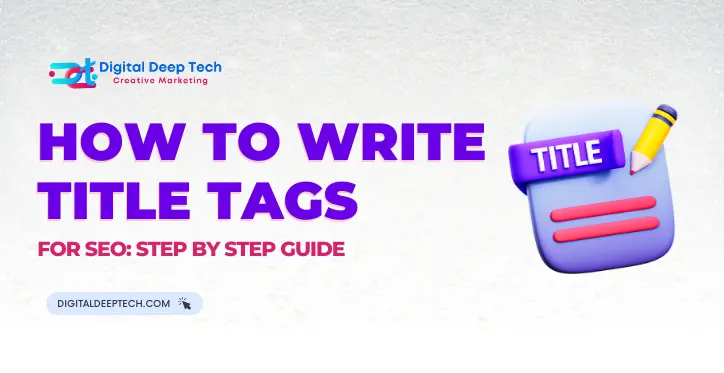
Table of the content
Introduction
Title tags are one of the essential concepts in SEO, which have been very less understood among people. So, in case you are targeting ranking improvement, you can know how to create great title tags that can be a game-changer for you.
I am Deepak Sharma, founder of Digital Deep Tech, and have over ten years of experience in the line of SEO. And with every step in this post “how to write title tags for SEO?”, you will exactly know what to do and create titles that rank well and capture more clicks.
Day 16 of the Free SEO Course
Learn advanced strategies, then reach out to get online training to take your skills to the next level!
1. Why Title Tags Matter in SEO
Many businesses have great content, but they cannot rank on the first page of Google. Title tags are ignored, and if not optimized, then the content will never reach a wider audience. Consider title tags as the “headline” of your page, a quick summary that tells both search engines and users what they’ll find on your site.
Importance of Title Tags in SEO
Without optimizing the title tags, you are leaving behind hidden treasures. It doesn’t necessarily mean that you haven’t provided relevant content on the pages since search engines will avoid viewing pages if title tags are not according to best practices of SEO. Fewer clicks mean lower traffic and ultimately do not convert visitors into desired actions. Think of how much time and efforts you spent on a blog post, but it still didn’t hit the bull’s eye with no first glance at a glance.
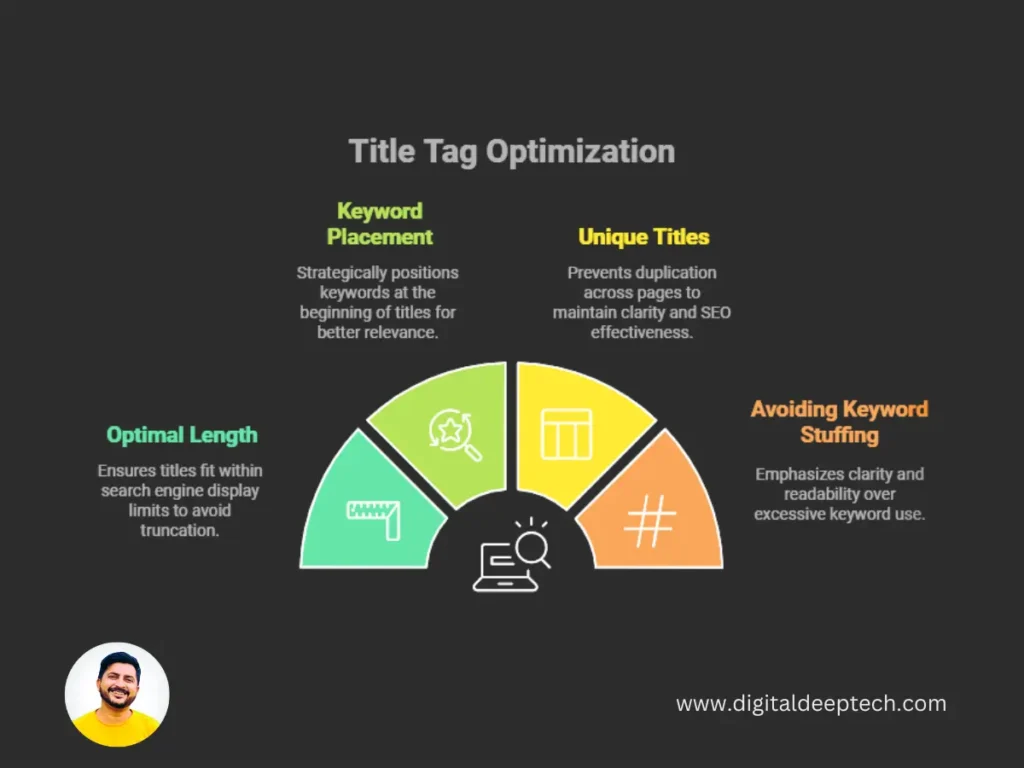
What is the right Solution?
You’ll be able to ensure your pages are super visible to both users and search engines with the optimization of title tags. Title tags aren’t about keyword stuffing; it’s about making a short, compelling message that reflects the value of your page.
2. Basics of Title Tag Optimization
The solution is readily available in that you make your content whatever the user is searching for. The positive way to achieve this is by learning the type of queries your audience poses and, from that learning, creating content providing the best possible answer.
Optimal Title Tag Length
This is the general rule according to Google, because it rarely shows more than 50-60 characters, that is why these titles ought to be around this character size.
You do not need to worry that they end up getting chopped off by the search bar, because such longer titles do get partially cut off so your intended message may look incomplete when cut off,.
Keyword placement
You have to place your keyword right in front of your title tag. Now, if the keyword you want to optimize is “best SEO tips,” “Best SEO tips for Beginners” is much better than “Beginners Guide to SEO”.
Unique Titles
Never repeat the title tag across different pages. Every title clearly describes what’s inside and specifically for the reasons of the page. When you repeat your title tags, it becomes confused to the search engine robots, and all your SEO is killed.
Avoid Keyword Stuffing
There is too much poor SEO strategy with too many keywords that even spoils the effect. So give prominence to clarity and reading.
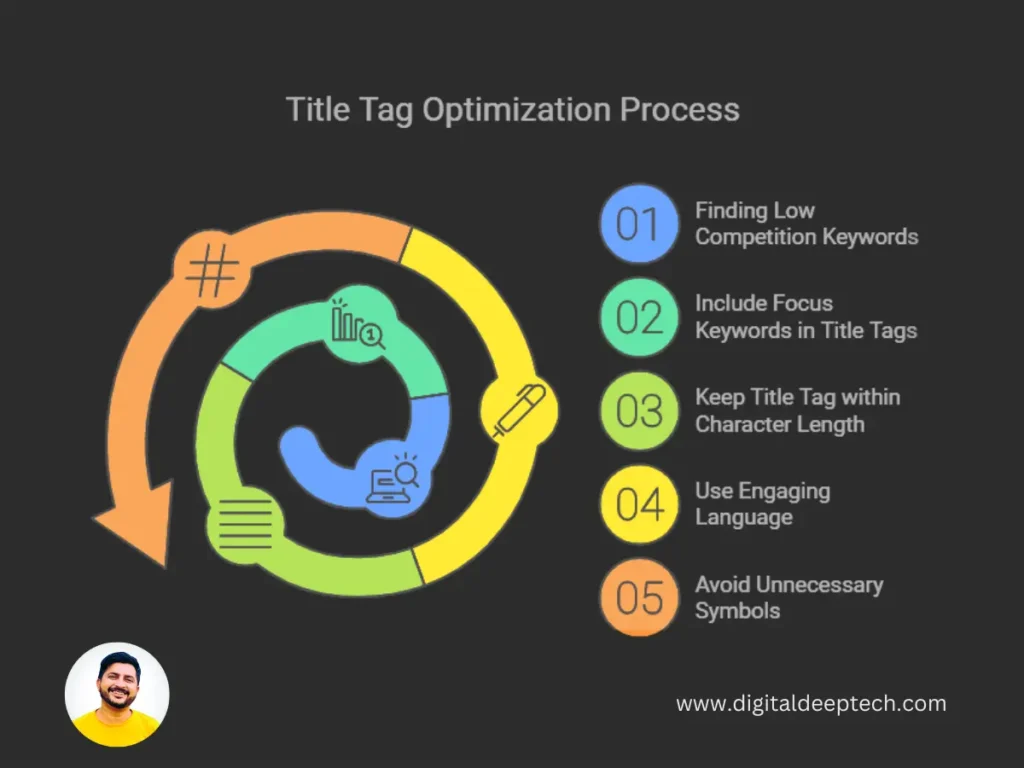
3. Best Way to Write Title Tags for SEO
Step 1: Finding Low Competition Keywords
Making your site rank better first of all involves finding low competition keywords. Targeting lesser competitive keywords makes it easier for your content to stand out in the very crowded search results. This is how you do it:
- Keyword Research Tools: Using Ahrefs, SEMrush, and Ubersuggest that have keyword difficulty volume data besides related searches will help the campaign better target words with a higher volume of search but lower competition.
- Competitor Analysis: What do competitors target? What can be made unique? Sometimes the difference is a matter of changed phrasing or merely different keywords.
- Identify Long-tail Keywords: Three+ words, more unique keywords and less competition usually. Long-tail keyword phrases are ideal for the purpose of attracting targeted visitors in a higher conversion-probable manner.
Step 2: Include Focus Keywords in Your Title Tags
Focus keywords should be closer to the title tag so that when search engines read an article, they know what its point is and it might probably boost CTR rates.
For instance, the phrase “how to write title tags for SEO” might generate a good title such as: “How to Write Title Tags for SEO: An Easy Guide.” This way, placing the keyword at the start of your title will strengthen your SEO and immediately hook the attention of the user.
Step 3. Keep the Title Tag within the Recommended Character Length
Titles are shown shortened to 50-60 characters in search results. Shortened titles can cause important words to be cut off, which can make the title less appealing. You get a clear and full message by using concise titles.
Step 4: Using engaging, descriptive language
A good title tag is more than keyword stuffing. You should make the title appealing enough to get clicks. Using action words such as “Learn,” “Discover,” or “Guide” after a clear benefit is very effective.
Examples:
- How to Optimize Title Tags for SEO: Step-by-Step Guide”
- Title Tag Tips: Boost Your Click-Through Rates”
Step 5: Avoid Unnecessary Symbols and Special Characters
This includes special characters such as “&” or “@”, which makes your title tags look messy. You can instead use just the standard punctuation to create your titles clean, readable, and search engine-friendly.
4. Title Tag Optimization Tools
Savings time and doing more quality work is really achievable when you use a title tag optimization tool. The following are some of the best and affordable SEO tools you can try.
- Yoast SEO: It will let you know at the real-time if the length of your title tag is just right, whether the keywords are correctly placed and whether the title tag is readable. Yoast is good for first time users because it indicates what needs improvement.
- Moz Title Tag Preview Tool: Moz allows previewing of the title tag. No word truncation will be observed by providing an opportunity to test several lengths.
- SEMrush: The keyword research and SEO insights are quite powerful in SEMrush, which will also provide you with the optimization of title tags and allow you to reach your competitors’ standards.
- Ahrefs: This is best if you’re looking for relevant keywords and competition analysis that would allow you to develop a unique title yet stay in line with the great potential for SEO.
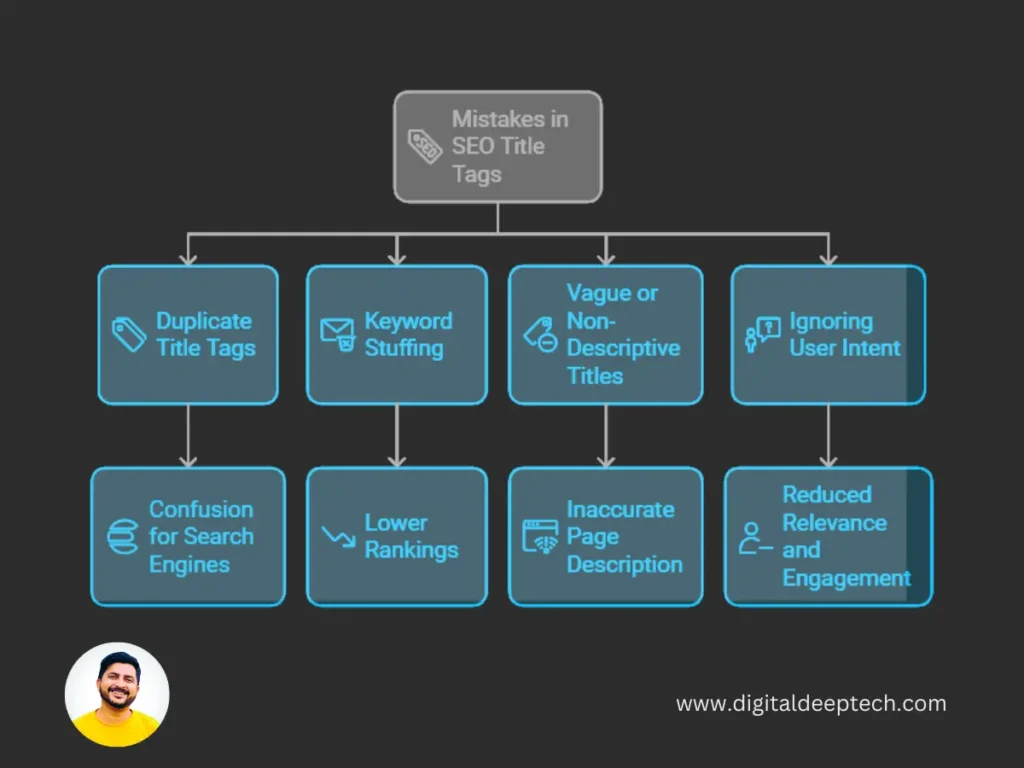
5. Mistakes to Avoid When Optimizing Title Tags
Even experts in SEO know how to create titles, yet they make a mistake with writing the right one. Here are the mistakes experienced SEO practitioners make when creating a title tag:
- Duplicate Title Tags Across Pages: Every page needs to have its own title tag. Search engines get confused and your efforts get diluted for SEO, thereby affecting the rankings.
- Keyword Stuffing: Too many keywords in your title tag look spammy and make you get lower rankings. Use one primary keyword and let the rest happen naturally.
- Vague or Non-Descriptive Titles: This is about ensuring that the title tag describes what’s contained in the page. For instance, “SEO Tips for Small Businesses” is better than “Business Tips,” since it tells specific information.
- Ignoring User Intent: Titles should be in line with what users are searching for. Develop titles that directly answer user queries or solve problems to improve relevance and engagement.
6. Optimize SEO Titles for Different Content Types
There are different types of content that perform better with different title tag strategies. Here’s how you would handle title tags when developing different formats:
1. Blog Posts
Blog posts work fantastic for information content that allows “how to” and “guides” format to create excellent title usage. Titles which include this style of format work better because it simply outlines to the reader exactly what a blog post will be displaying.
Example: “How to Write Title Tags for SEO: A Step-by-Step Guide”
2. Product Pages
Product pages need to be extremely minimalist. The names and headline benefits of products make it even clearer to the customer what he needs. Their titles should carry a description of the product type, brand, and the most obvious benefits.
Example: “Organic Cotton T-Shirt – Soft, Sustainable, Affordable”
3. Service Pages
Service pages should be full of as much information regarding the service offered as possible to draw in more clients. You also provide services offered and if need be, your location.
Example: “Local SEO Services in Sydney: Grow Your Business Online”
7. Useful Tips and Resources for First Timers
If this is your first time of title tag optimization, you will find the following useful tips:
- Tools and Try Them: If you are using either Yoast SEO or Moz, these can really be a godsend in trying to get a title structure sorted out while also displaying previews that could make things even easier from the perspective of optimising your visibility.
- Top Competitors Analysis: Now look at title tags in pages that top rank on your desired keyword lists. Understand how they built it; how they’ve worded it; positioning keywords, etc.
- Test and Monitor: Don’t wait to alter your title tags if they’re not doing well. Periodically follow CTR and other performance metrics to determine if any changes are needed.
Beginner Resources
- Google Keyword Planner: Very good for keyword discovery as well as determining competition.
- Yoast SEO: Good for real-time feedback on the length and the structure of the title tag.
- SERP Simulator: Preview title tags to make them look perfect in the search results.
Let's Discuss Your Project
Get a free one-week consultation and share your vision for digital marketing with us.
Conclusion
Optimized title tags are only some of the critical requirements to apply a successful SEO campaign. One has to use these guidelines in order to stay away from all the errors. It will make all the maximum difference not just in rank but also in CTR. Optimization of the title tag may seem some trivial matter, but it can really prove useful in both cases of SEO as well as user interaction purposes.
Like More Guidance? WhatsApp @+91 9780668174 or book an appointment with our SEO expert.
Share this Post IF you found it valuable. and don’t miss on subscribing our YouTube channel for more SEO TIPS!
Frequently Asked Questions (FAQs)
What Is Title Tag in SEO?
A title tag is a markup element that defines the name of an HTML document. For a web page, it is visible as a clickable headline for the result in a list of search engine results, as well as in browser tabs, and is one of the factors that decide the organic search rankings and click-through rate. If it is written correctly, an optimized title tag is what describes the content of a web page to search engines.
2. How long is good enough for a title tag?
The average length of an optimal title tag is 50-60 characters. Google shows approximately 60 characters in search results so making sure it is this size ensures your title tag does not get truncated. The actual length can differ depending on the character set, so previewing your title tag is always a good idea.
3. How do I choose my keywords for title tags?
Keywords for title tags rely on relevant high-value terms related to the content on your page. Focus on low-competition keywords highly relevant to your target audience. You can utilize tools like Google Keyword Planner, Ahrefs, or SEMrush.
4. What are low-competition keywords and why do they matter?
Low-competition keywords are those for which fewer websites are targeting. It is, therefore, easier to rank for them. They are particularly important for new or lesser-established websites as they represent a means of attracting organic traffic without competing with high-authority sites.
5. Can I use more than one keyword in the title tag?
Yes, you can put more than one keyword in the title tag, but only to the extent that one doesn’t turn into a keyword stuff. Concentrate on a main keyword then a secondary keyword which actually complements the first keyword. Just ensure that the title reads well and is quite catchy for the reader.
6. Is a title tag same as meta description?
No, these are different for title tags and meta description. The title tag appears as the main clickable headline in search results, whereas meta description describes the content contained in a page with its brief summary. These also have unique roles in their respective impacts on SEO along with users.
7. What common mistakes should we avoid making with title tags?
Some of the common errors are the duplication of title tags, keyword stuffing, and vague or irrelevant titles. You should avoid these using unique, clear, and keyword-optimized titles describing what your page content is.
8. Does the title tag have an effect on click-through rates?
Indeed, title tags are the prime influencers of click-through rate. A great title tag is one that has drawn interest and clicks. In return, a lousy or poorly written title tag makes people less likely to be engaged. Therefore, through clarity, relevance, and appeal, optimization will drive up CTR.
9. Can I change my title tags over time?
Absolutely. Nice to refresh and renew titles periodically with the available data that is there: CTRs and rankings over time. In fact, the iteration keeps one responding to the evolving fluidity of search trends and the evolution in the relevancy along with accompanying visibility boost.
10. What can help optimize the title tags?
The following can help optimize the utilization of the titles used:
- Yoast SEO: real-time feedback on length of title, whether keyword is included, reading level
- Moz Title Tag Preview Tool: to see how your title tag is going to look in search results
- SEMrush and Ahrefs: excellent tools for keyword research and competitor analysis
- SERP Simulator: great tool showing how your title tags are going to display on Google results.

About the Author
Deepak Sharma is the founder of Digital Deep Tech and a renowned SEO and digital marketing expert with over a decade of experience. Passionate about helping businesses enhance their online presence, Deepak specializes in creating SEO strategies that drive traffic and generate leads.
how to Write Title Tags for SEO? A Step-by-Step Guide Read More »

